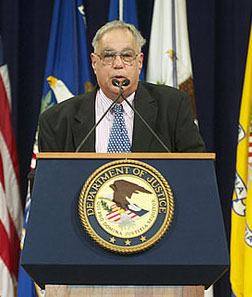From 2012 until 2014, Billy Robinson, Jr., was part of a criminal conspiracy that bought heroin in Chicago, transported it north into Wisconsin, and sold it in Milwaukee. The conspirators ultimately were arrested and, in time, Robinson pleaded guilty in federal court to two charges of traveling in interstate commerce to facilitate heroin distribution.
Robinson’s case was assigned to the Honorable Rudolph T. Randa, then a judge in active service on the United States District Court for the Eastern District of Wisconsin. (For his biography, click here.) Judge Randa accepted Robinson’s guilty plea and sentenced him to 84 months’ imprisonment.
The legal problem in the case arose with Judge Randa’s comments at Robinson’s sentencing hearing. Before imposing the sentence, Judge Randa offered various remarks on urban decay; how Robinson’s Milwaukee neighborhood had changed from one of safety in the early 1960s, when Randa knew it as a college student, to an unsafe neighborhood today; how Milwaukee riots in 1967 resembled recent Baltimore protests against police brutality; how 1967 anti-Vietnam War protests in Milwaukee had impeded Randa’s deployment to military service; how the “real problem” is that Robinson has five children by four different mothers; and so on.
Robinson appealed the legality of his sentence. He argued that Judge Randa’s comments make it impossible to determine whether he sentenced Robinson based on the relevant criteria specified in federal law.
Last week, a panel of the U.S. Court of Appeals for the Seventh Circuit agreed with Robinson. Chief Judge Diane P. Wood, on behalf of a three-judge panel, wrote that Judge Randa’s “comments during the sentencing strayed so far from the record that [the court of appeals] cannot trace the (legitimate) reasons for Robinson’s sentence….” (For the whole opinion, forceful in its brevity and understated tone, click here. The opinion does not, alas, reproduce the full transcript of Judge Randa’s comments before he sentenced Robinson.)
To correct Judge Randa’s error, the Court of Appeals vacated Robinson’s sentence and sent the case back for resentencing.
And, wrote Chief Judge Wood in her opinion’s final sentence, “Circuit Rule 36 shall apply on remand.”
That cryptic statement was an act of judicial kindness to Judge Randa. Rule 36 (click here) empowers the Court of Appeals, when remanding a matter to a trial court, to reassign it to a new judge. Chief Judge Wood’s final sentence, which could well have used Judge Randa’s name or at least explained exactly what was being ordered, means that Robinson’s case must be reassigned from Judge Randa to another judge, and not returned to Judge Randa, for resentencing.
As the Court of Appeals surely knows, Judge Randa recently took senior status (semi-retirement). As part of that move, it seems, at least according to press from last winter (e.g., click here), that he is electing not to hear new criminal matters.
But Robinson’s case is, for Judge Randa, old business. If the Court of Appeals had not ordered that Rule 36 would apply, the case would have come back to him. Now, no matter his preference, it cannot.

